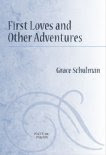Screenings of “Blessed is the Match: The Life and Death of Hannah Senesh”
I really thought that I’d blogged about attending a screening of “Blessed is the Match: The Life and Death of Hannah Senesh” last spring, but I’m not finding anything in the blog archive. Which astonishes me, because I have spent so much time thinking (and talking) about that film in all the months since. I also bought Hannah Senesh’s diary, which remains patiently waiting on my nightstand for my close attention.
In any case, I’ve also been thinking about Senesh more recently because a new addition to my to-do list is going downtown to the Museum of Jewish Heritage to see the just-opened exhibition, “Fire in My Heart: The Story of Hannah Senesh.” Fortunately, I have some time: “Fire in My Heart” runs into August 2011. But I may go earlier–especially if I think I can withstand the emotional intensity of re-watching the documentary I saw last spring–because the MJHNYC is going to offer several free screenings with paid museum admission. Here are the details:
“In conjunction with the new exhibition, Fire in My Heart: The Story of Hannah Senesh, the Museum of Jewish Heritage — A Living Memorial to the Holocaust will be offering screenings of Roberta Grossman’s award-winning film Blessed is the Match: The Life and Death of Hannah Senesh (2008, USA, 85 min.), a documentary about the World War II-era poet, diarist, and resistance fighter. The film, which is narrated by acclaimed actress Joan Allen, is the first documentary feature about Hannah Senesh’s extraordinary life.
The screenings will take place at 11 a.m. and at 1 p.m. on October 31, November 21, 28, and December 19. Tickets are free with Museum admission and can be picked up at the box office on the day of the screening. For more information about the exhibition, please visit www.mjhnyc.org/hannah.”
One more thing: You don’t quite realize how lasting Senesh’s legacy is until you hear Israeli schoolchildren–including children of Ethiopian Jewish descent–singing Eli, Eli at the Leo Baeck Education Center’s school in Haifa. As I did less than three weeks ago.
